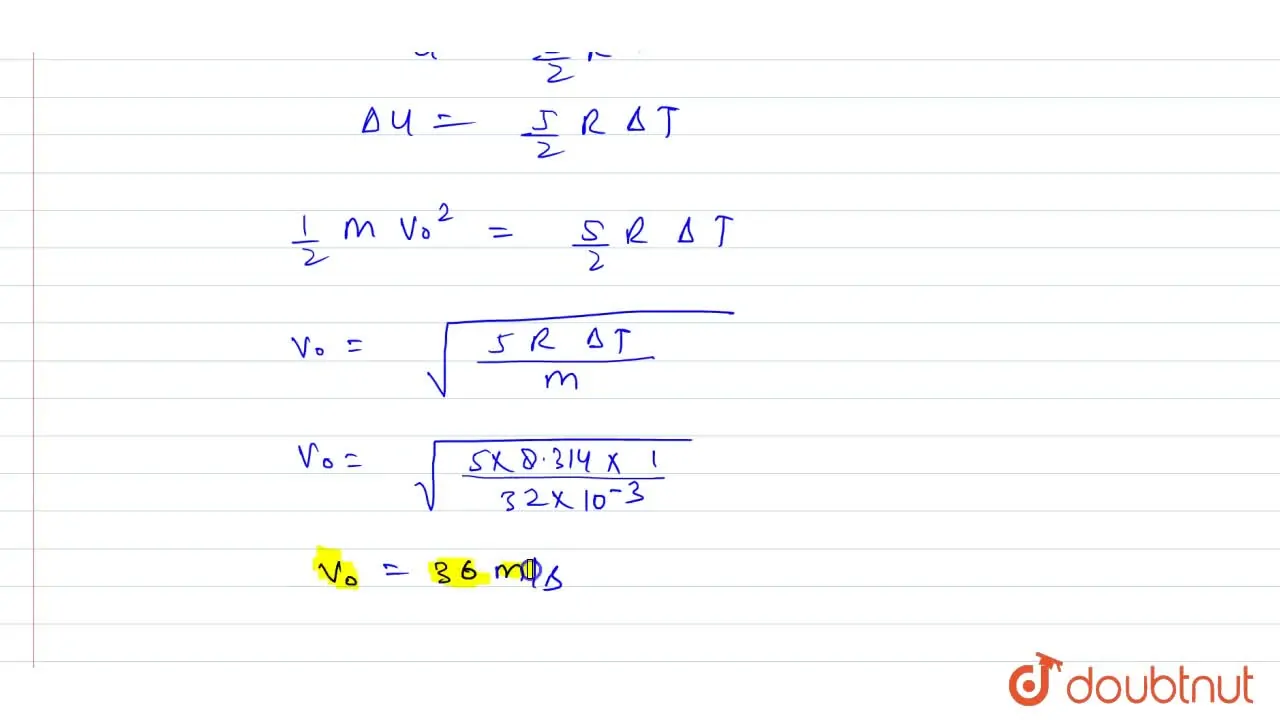1g mole of oxygen at 27∘C and (1) atmosphere pressure is enclosed in a vessel.
(a) Assuming the molecules to be moving with (vrms, find the number of collisions per second which the molecules make with one square metre area of the vessel wall.
(b) The vessel is next thermally insulated and moves with a constant speed (v0. It is then suddenly stoppes. The process results in a rise of temperature of the temperature of the gas by 1∘C. Calculate the speed v0.[k=1.38×10−23J/K and NA=6.02×1023/mol].
The correct Answer is:A, B, C, D
(a) Mass of one oxygen molecule,
m=MNA
= 326.02×1023g
= 5.316×10−23g
=5.316×1026kg
vrms=√3kTm
= √3×1.38×10−23×3005.316×10−26
= 483.35m/s
change in momentum per collision,
Δp=mvrms−(−mvrms)=2mvrms
= (2)(5.316×10−26)(483.35)
= 5.14×10−23kg−m/s
Now, suppose (n) particles strike per second
F=nΔp=(n)(5.14×10−23)N (Fext=dpdt)
Now, as p=FA, for unit area F=p
∴(n)(5.14×10−23)=1.01×105
or n=1.965×1027 per second
(b) When the vessel is stoppes, the orderd motion of the vessel converts into disordered motion and temperature of the gas is increased.
∴12mv20=ΔU ...(i)
U=52RT (for 1 g mole of O_2)
∴ ΔU=52RΔT
Here, (m) is not mass of one gas molecule but it is the mass of the whole gas.
m=massof1mol=32×10−3kg
Substituing these values in Eq. (i), we get
v0=(√5RΔTm)
= (√5×8.31×132×10−3)
= 36m/s.
Related Playlists
- BOOK - DC PANDEYCHAPTER - THERMOMETRY,THERMAL EXPANSION & KINETIC THEORY OF GASESEXERCISE - Miscellaneous Example5videos
THERMOMETRY,THERMAL EXPANSION & KINETIC THEORY OF GASES
- BOOK - DC PANDEYCHAPTER - THERMOMETRY,THERMAL EXPANSION & KINETIC THEORY OF GASESEXERCISE - Exercise 20.15videos
THERMOMETRY,THERMAL EXPANSION & KINETIC THEORY OF GASES
- BOOK - DC PANDEYCHAPTER - THERMOMETRY,THERMAL EXPANSION & KINETIC THEORY OF GASESEXERCISE - Example Type 21videos
THERMOMETRY,THERMAL EXPANSION & KINETIC THEORY OF GASES
- BOOK - DC PANDEYCHAPTER - THERMOMETRY THERMAL EXPANSION AND KINETIC THEORY OF GASESEXERCISE - Medical entrance gallary30videos
THERMOMETRY THERMAL EXPANSION AND KINETIC THEORY OF GASES
- BOOK - DC PANDEYCHAPTER - UNIT AND DIMENSIONSEXERCISE - Assertion And Reason2videos
UNIT AND DIMENSIONS
Similar Questions
One gram mole of oxygen at 27∘C and one atmospheric pressure is enclosed in a vessel. Assuming the molecules to be moving with vrms, find the number of collisions per second which the molecules make against one square metre of the vessel wall.
View Solution1g mole of oxygen at 27∘C and 1 atmosphere pressure is enclosed in a vessel.
(a) Assuming the molecules to be moving with vrms, find the number of collisions per second which the molecules make with one square metre area of the vessel wall.
(b) The vessel is next thermally insulated and moves with a constant speed v0. It is then suddenly stoppes. The process results in a rise of temperature of the gas by 1∘C. Calculate the speed v0.[k=1.38×10−23J/K and NA=6.02×1023/mol].View SolutionOne gram mole NO2at47∘C and 2 atm pressure in kept in a vessel. Assuming the molecules to be moving with (rms) velocity. Find the number of collisions per which the molecules make with one square metre area of the vessel wall.
View SolutionOne gram mole of nitrogen at 27∘C and 1 atm pressure is contained in a vessel and the molecules are moving with their speed. The number of collisions per second which the molecules make with an area of 1m2 on the vessel's wall is
View SolutionA vessel containing one gram-mole of oxygen is enclosed in a thermally insulated vessel. The vessel is than moved with a constant speed v0 and then suddenly stopped. The process results in a rise in the temperature of the gas by 1∘C. Calculate the speed v0.
View SolutionA vessel containing one gram -mole of oxygen is enclosed in a thermally insulated vessel. The vessel is next moved with a constant speed v0 and then suddenly stopped. The process results in a rise in the temperature of the gas by 1∘c. Calculate the speed v0.
View SolutionA cubical vessel of side 1 metre contains one gram molecule of nitrogen at pressure of 2 atmospheres and 300 K. If the molecules are assumed to move with their rms velocity find the number of collisions per second which he molecules can make with the wall of vessel. Further if the vessel now thermally isolated moved with a constant speed V and then suddenly results in a rise of temperature 2∘C. Find V.
View SolutionA cubical vessel of side 1 m contains one mole of nitrogen at a temperature of 300 K. If the molecuels are assuming to move with the rms velocity
find the number of collisions per second which the molecules may make with the wall of the vesselView SolutionA cubical vessel of side 1 m contains one mole of nitrogen at a temperature of 300 K. If the molecuels are assuming to move with the rms velocity
further if the vessel now thermally insulated moved with a constant speed v and then suddenly stopped and this results in rise of temperature by 2∘C, find v.View SolutionA container has an ideal gas at pressure P in thermal equilibrium. Assuming the mass of a molecule is m and all the molecules are moving with same speed v in random directions, the expression for number of collisions per second which the molecules make with unit area of container's wall is √xPmv, Find (x+y).
View Solution


